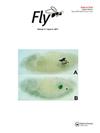在随后的战斗中,策略会随着果蝇战斗的输赢而改变
IF 2.4
4区 生物学
Q3 BIOCHEMISTRY & MOLECULAR BIOLOGY
引用次数: 14
摘要
在争夺食物、领地和配偶的过程中,雄性果蝇(Drosophila melanogaster)与同种果蝇进行了激烈的接触。获取这些资源的战斗策略受到过去和现在的经验、环境线索以及动物的内部状态(包括激素和遗传影响)的影响。经历过失败的动物表现出顺从的行为,更有可能在第二次比赛中失败,而赢得第一次战斗的动物更具攻击性,更有可能赢得第二次比赛。在最近的一份报告中,我们更详细地研究了这些输家和赢家的影响,并证明赢家和输家都对之前的比赛结果表现出短期记忆,而只有输家表现出需要蛋白质合成的长期记忆。最近的研究结果还表明,个体识别机制可能存在,可以在评估对手的战斗能力和影响未来的战斗策略中发挥重要作用。在这篇文章中,我们通过寻找领土标记的证据,并根据我们的发现讨论现有文献,来跟踪这些结果,询问先前失败和获胜的苍蝇如何在第二失败和获胜的苍蝇面前改变它们的战斗策略。本文章由计算机程序翻译,如有差异,请以英文原文为准。
Strategy changes in subsequent fights as consequences of winning and losing in fruit fly fights
ABSTRACT In competition for food, territory and mates, male fruit flies (Drosophila melanogaster) engage in agonistic encounters with conspecifics. The fighting strategies used to obtain these resources are influenced by previous and present experience, environmental cues, and the internal state of the animal including hormonal and genetic influences. Animals that experience prior defeats show submissive behavior and are more likely to lose 2nd contests, while animals that win 1st fights are more aggressive and have a higher probability of winning 2nd contests. In a recent report, we examined these loser and winner effects in greater detail and demonstrated that both winners and losers show short-term memory of the results of previous bouts while only losers demonstrate a longer-term memory that requires protein synthesis. The recent findings also suggested that an individual recognition mechanism likely exists that can serve important roles in evaluating the fighting ability of opponents and influencing future fighting strategy. In this article, we follow up on these results by asking how previous defeated and victorious flies change their fighting strategies in the presence of 2nd losing and winning flies, by searching for evidence of territory marking, and discussing the existing literature in light of our findings.
求助全文
通过发布文献求助,成功后即可免费获取论文全文。
去求助
来源期刊

Fly
生物-生化与分子生物学
CiteScore
2.90
自引率
0.00%
发文量
17
审稿时长
>12 weeks
期刊介绍:
Fly is the first international peer-reviewed journal to focus on Drosophila research. Fly covers a broad range of biological sub-disciplines, ranging from developmental biology and organogenesis to sensory neurobiology, circadian rhythm and learning and memory, to sex determination, evolutionary biology and speciation. We strive to become the “to go” resource for every researcher working with Drosophila by providing a forum where the specific interests of the Drosophila community can be discussed. With the advance of molecular technologies that enable researchers to manipulate genes and their functions in many other organisms, Fly is now also publishing papers that use other insect model systems used to investigate important biological questions.
Fly offers a variety of papers, including Original Research Articles, Methods and Technical Advances, Brief Communications, Reviews and Meeting Reports. In addition, Fly also features two unconventional types of contributions, Counterpoints and Extra View articles. Counterpoints are opinion pieces that critically discuss controversial papers questioning current paradigms, whether justified or not. Extra View articles, which generally are solicited by Fly editors, provide authors of important forthcoming papers published elsewhere an opportunity to expand on their original findings and discuss the broader impact of their discovery. Extra View authors are strongly encouraged to complement their published observations with additional data not included in the original paper or acquired subsequently.
 求助内容:
求助内容: 应助结果提醒方式:
应助结果提醒方式:


